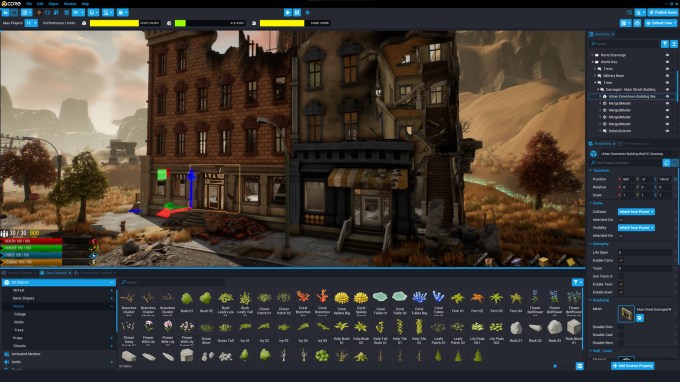A self-described “endless arcade,” Core feels like a 90s cyberpunk fever dream come to life. Half playable game library, half no-code game creator, all neon lights, the new platform is a surprisingly well-realized vision of this metaverse thing everyone sure seems to be talking about lately.
Billing itself as your “portal to the multiverse,” Core is primed to test the age-old proposition If you build it, they will come. Giant companies like Roblox and Facebook might have huge established platforms, but Core has laid some very compelling groundwork for creators and players alike.
Logging in, players are transported to Core’s central hub, a fitting cross between a theme park, a high-tech mall and a casino, with entertainment and shopping a few gravitationally unburdened strides away in every direction. Giant neon signs beckon, enticing players to hop into myriad user-generated virtual worlds. Swapping out clothing and in-game gear or inviting a friend to jump in with you takes only a few clicks, and just cruising around and people watching is plenty interesting.
If Core looks a lot like Fortnite, that’s not a coincidence. Core, made by Manticore Games, runs on Fortnite-maker Epic’s Unreal engine. And those ties are even deeper: Epic led a $15 million round of investment in the company last year and the platform is exclusively available through the Epic Games Store for PC. In March, Manticore raised $100 million more from a grab bag of major investors and took its creator platform live.

Core might not be a household name yet, but it’s already nailed one of the challenges that any metaverse aspirant has to crack. In my time playing around with Core, the experience of getting from one place to another was often so seamless I wound up in the wrong place by accident. Chalk this up to user error, but instantly being transported — to a Deadmau5 show, to an overgrown dystopian wasteland, to a isometric pirate game — after walking through various portals was one of the more seamless online multiplayer experiences I’ve had in more than a decade of those games.
Core looks great. That’s one strike against Roblox, one of the most successful companies building out a vision for the metaverse. Much like Fortnite, Core’s graphics are cartoony but not too cartoony. Roblox’s under-13 crowd is aging up — a factor that company is actively planning around — and those not-so-young players may soon be looking for a new virtual home with more mature vibes.
Any aspiring edgelord would be able to take themselves plenty seriously with Core’s wide selection of custom outfits and avatars. Or you could be a kitty.

Deadmau5, metaverse resident
Most of Core’s content is UGC, a.k.a. user-generated content, a new-ish name for an era-defining online phenomenon (don’t blame yourself if the acronym evokes mixed martial arts). But Manticore also has plenty of room to partner up with musicians and brands for elaborate themed in-game experiences.
This week, DJ and EDM festival perennial Deadmau5 launched his own, a sprawling, colorful series of experiences described as a “permanent residency in the metaverse.” Core is mostly home to user-made games, but it’s also a natural fit for entertainment and even education — the team noted that some users started hosting game development classes.
#oberhasli is now open via @CoreGames on @EpicGames!!!
first show kicks off tomorrow at 3pm PT with additional concert times running through the weekend :D https://t.co/i1sKwYnnlp pic.twitter.com/eMkbVzN2Nb
— Goat lord (@deadmau5) October 14, 2021
Unlike recent shows in other virtual worlds like Lil Nas X in Roblox or Ariana Grande in Fortnite, the Deadmau5-themed content will stay live after it debuts for anyone to explore. The team at Manticore likened this to how performers like Penn and Teller camp out in Las Vegas for ongoing shows, and the metaphor is very appropriate. But unlike Vegas, performers can be in two places at once: Deadmau5 also announced he’d participate in a music festival hosted on the Ethereum-based virtual platform Decentraland this week.
I watched the show with Deadmau5, né Joel Zimmerman, for an early sneak preview. He wore one of his signature giant animal helmets (I think a cat?) and cyborg angel wings, while I opted for an understated black hoodie, the little black dress of the metaverse.
“I think what drew me to it was the modularity of it all and how it gives more tools to creators,” Zimmerman told me, hopping around wildly in Core while reclining IRL in a gaming chair emblazoned with the Deadmau5 mouse.

Like we’ve come to expect from virtual concerts, the interactive performance is well-stocked with melting psychedelic visuals, mini games and a menacing Chain Chomp-esque mouse with turntable ears. Zimmerman and Core co-founders Frederic Descamps and Jordan Maynard who also ran around the show with me had seen it at least 10 times, but everyone still seemed to genuinely be having fun.
At some point I either fell into lava or got smashed on a conveyer belt by a massive metal fist while a Deadmau5-themed villain loomed nearby. “I think it’s the only interactive concert you can die in,” Maynard said. The show was visually a lot of fun, creatively interactive and ultimately a lot like concerts in Fortnite, which sets a high bar for this stuff.
The elaborate virtual experience, called Oberhasli, also showcases some unique worlds created by fans with no prior game dev experience, from an eerie jungle ruin to a spooky world full of floating space debris. The Core Deadmau5 performance kicks off on Friday at 3 PM PT. It’ll replay over the weekend and be available on demand afterward, for anyone else who’d like to be smashed into an EDM pancake.

Core for creators
Later on our call, held on Discord, the Core tour devolved into everyone running through a secret gate behind a destructible wall and world-hopping wildly through game genres, each remarkably polished for something that doesn’t require any code or game development experience. Moving from one game world to another took seconds even with a terrible Wi-Fi connection, including the time I ran through something that looked like World of Warcraft’s dark portal and wound up sailing an isometric pirate ship.
The WoW nod is probably not a coincidence. Descamps waxed nostalgic about the heyday of WoW machinima, narrative movies built through captured gameplay, like only a serious longtime player could. Descamps and Maynard also previously worked on Rift, another fantasy MMO that still commands a loyal following a decade on. (Maynard was employee No. 7.) Everyone is raving about the metaverse these days, but surprisingly few companies in the space trace their roots back to the seamless virtual gaming worlds that have brought people together for years.

To underline how easy it is to make stuff in Core, Maynard quick-built a first-person shooter for us to play, a drag-and-drop process that took maybe two minutes of dipping into Core’s huge library of original in-game assets that were created using its system. Grab a handful of 3D objects and pick a game mode from the template choices (battle royale, racing or dungeon crawler?) and you’re most of the way to a polished-looking playable game built in Core’s modular sandbox. Setting your game in a chilly snowscape or a barren desert is also as simple as dragging and dropping, lending the environments an expansive feel.
Gameplay aside, out of the box Core games look light years better than the UGC you’d run across in Roblox, though that platform’s users have never seemed to mind. The breadth of visual styles and game genres is also mind-boggling for anyone who’s bounced out of samey UGC on other platforms.
Rec Room raises at $1.25B valuation from Sequoia and Index as VCs push to find another Roblox
Core users who create content have a pretty good swath of monetization options, which Manticore calls “perks.” That includes offering in-game cosmetic items, but also charging for premium games, selling Fortnite-like battle passes or implementing a subscription model. The revenue split is 50/50, which looks generous next to the 25% that Roblox passes on to creators. And in Core, like in other modular game-making platforms, everyone is a creator — no development experience needed.
Core is PC-only for now, but Manticore plans to bring it to other platforms, including iOS, starting next year. Game creation will likely stay limited to PC, but the idea is that anyone could play Core games anywhere, a platform agnostic vision that certainly boosted Fortnite early on and Roblox more recently.
“[Game development] is kind of like baking: a very precise formula, technical, can take weeks to iterate,” Descamps said. But in Core, the technical stuff gets out of the way and a process that would normally drag on can happen in minutes, leaving the rest of the time for experimentation and play.
“What if you put a portal gun into Mario Kart?” Maynard asked, and I’m fairly certain we could have found out right then.
Roblox pushes toward avatar realism, plans to add NFT-like limited-edition items
Manticore Games raises $100 million to build a ‘creator multiverse’































Comment